
The Greek island of Ikaria is one of the world’s five Blue Zones, regions where people live significantly longer and healthier lives. Among the secrets of Ikarian longevity lies an ancient, unassuming beverage that locals sip daily: traditional Greek coffee. Packed with antioxidants and health-enhancing compounds, this cultural staple is more than a morning ritual; it’s a health-promoting powerhouse. Let’s delve into the scientifically-backed health benefits of traditional Greek coffee, explore its preparation process, and uncover its nutritional value.
What Is Traditional Greek Coffee?
Traditional Greek coffee, or “Ellinikós kafés,” is a strong, unfiltered coffee brewed using finely ground coffee beans. It is boiled in a small, specially designed pot called a briki and served in a demitasse cup with a frothy layer called kaimaki. Unlike other coffee varieties, Greek coffee is unfiltered, allowing its rich compounds to remain intact, which contributes to its unique flavor and health benefits.

Health Benefits of Traditional Greek Coffee
1. Rich in Antioxidants
Greek coffee is a natural source of powerful antioxidants like chlorogenic acid and polyphenols. These compounds combat oxidative stress in the body, which is linked to aging and chronic diseases. Studies have shown that the antioxidant properties of unfiltered coffee may reduce inflammation and protect against cellular damage.
2. Improves Heart Health
Research conducted in Ikaria suggests that moderate consumption of traditional Greek coffee is associated with improved cardiovascular health. The high concentration of antioxidants and polyphenols supports endothelial function, enhancing blood vessel health and reducing the risk of heart disease.
3. Boosts Longevity
A study published in Vascular Medicine found that regular consumption of Greek coffee is linked to increased life expectancy, particularly among elderly populations in Ikaria. The beverage’s anti-inflammatory and heart-protective properties contribute significantly to longevity.
4. Supports Cognitive Function
Greek coffee contains caffeine, a stimulant known to improve focus, memory, and mental clarity. The slow-release caffeine from unfiltered coffee provides sustained energy without the jittery spikes often associated with filtered coffee varieties.
5. Aids Digestion
Unlike heavily processed coffee, Greek coffee is minimally processed, retaining beneficial compounds that promote digestive health. It contains niacin, a B-vitamin that supports healthy digestion and metabolism.
6. Promotes Metabolic Health
Studies show that Greek coffee helps regulate blood sugar levels and improves insulin sensitivity, reducing the risk of type 2 diabetes. The beverage’s high levels of magnesium and potassium support overall metabolic function.
7. Protects Against Neurodegenerative Diseases
Consuming Greek coffee regularly may lower the risk of Alzheimer’s and Parkinson’s disease. This is attributed to its rich antioxidant content and moderate caffeine levels, which protect brain cells from damage.

The Anticancer Potential of Greek Coffee: Exploring Scientific Evidence
Traditional Greek coffee, known for its unfiltered preparation, retains higher concentrations of bioactive compounds such as cafestol and kahweol. These diterpenes have demonstrated potential anticancer properties in various studies. Research indicates that cafestol can induce apoptosis (programmed cell death) in cancer cells and inhibit their proliferation. Similarly, kahweol has been shown to suppress the growth of cancer cells and enhance the efficacy of certain chemotherapy agents. The presence of these compounds in Greek coffee suggests that its regular consumption may contribute to cancer prevention. However, it’s important to note that most studies have been conducted in vitro or on animal models, and further research is needed to confirm these effects in humans.
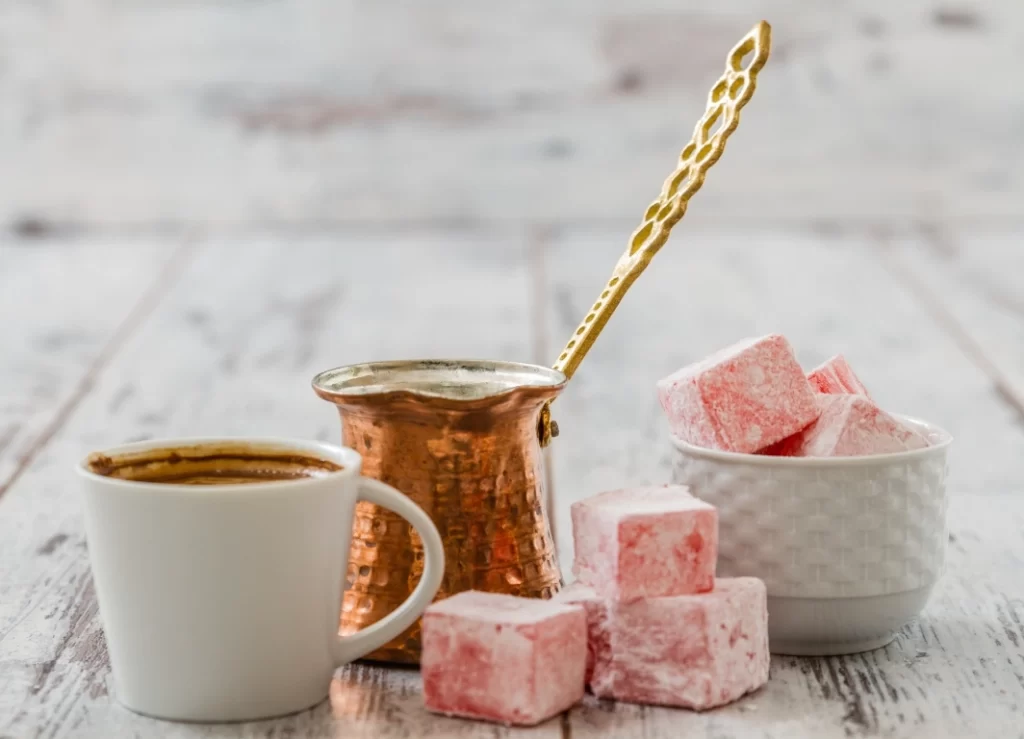
How to Make Traditional Greek Coffee
Ingredients:
- 1 cup of cold water (use a demitasse cup for measurement)
- 1 teaspoon of finely ground Greek coffee
- Sugar (optional; traditionally served with ½ or 1 teasp
- Chios Mastic, cinnamon or green cardamomum (a pinch, optional depending on your mood.)
Equipment:
- A briki (small pot)
- A demitasse cup
- A small spoon
Procedure:
- Measure the Water
Fill the demitasse cup with cold water and pour it into the briki. - Add Coffee and Sugar
Add one teaspoon of finely ground Greek coffee to the briki. If desired, add sugar (lightly sweetened is “metrios”; sweeter is “glykos”). - Mix Thoroughly
Stir the mixture well before placing it on the stove. Do not stir again after this step. - Heat Slowly
Place the briki over medium-low heat. Heat the coffee slowly to ensure it doesn’t boil too quickly, which would ruin the frothy kaimaki. - Watch for Froth
As the coffee begins to heat, froth will form on the surface. Just before the coffee starts to boil, remove it from the heat. - Pour and Serve
Gently pour the coffee into a demitasse cup to retain the froth on top. Allow the grounds to settle at the bottom before drinking.
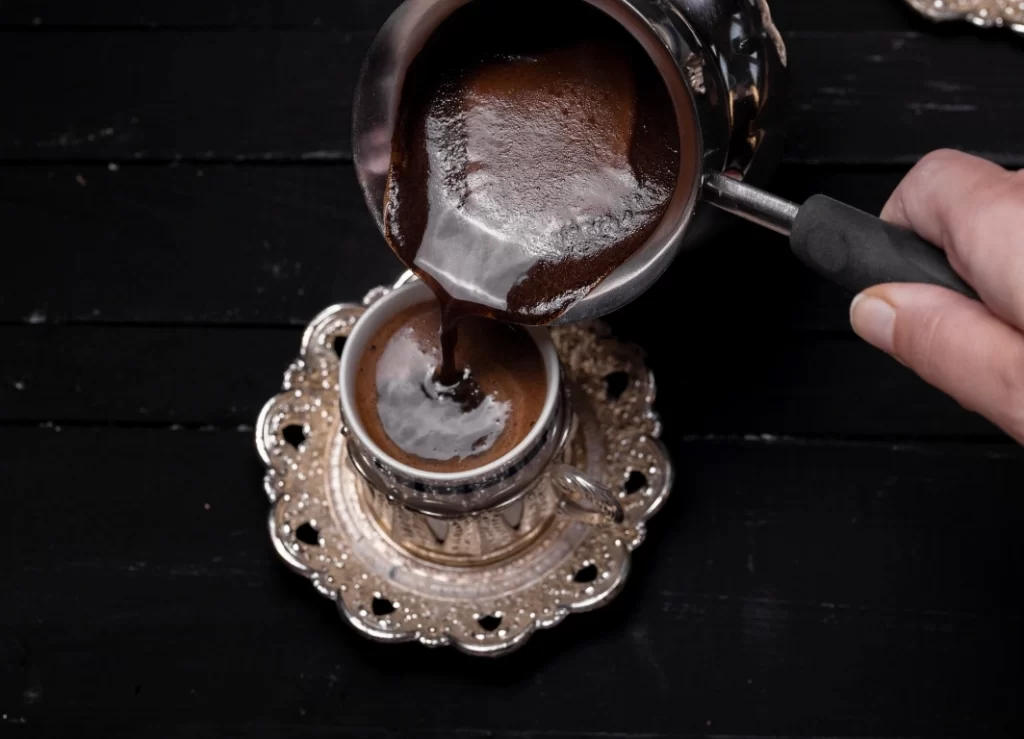
Types of Greek Coffee: From Tradition to Modern Twists
Ordering Greek coffee is more than choosing a drink—it’s about savoring a tradition deeply rooted in Greek culture. While enjoying its flavors, one can also appreciate the artistry and sentiment that comes with preparing and serving it. Here’s an overview of the different types of Greek coffee and their significance:
- Sketos (σκέτος): Meaning “plain,” this coffee is made without sugar, highlighting the pure and bold flavor of the brew. It’s a favorite for those who enjoy the natural bitterness of coffee.
- Metrios (μέτριος): The most popular choice, this balanced option uses equal parts sugar and coffee (typically one teaspoon each), offering a mild sweetness while preserving the coffee’s robust character.
- Glykos (γλυκός): This sweet version contains about two teaspoons of sugar, making it rich and indulgent while still retaining the essence of the coffee.
- Vari Glykos (βαρύ γλυκός): A dessert-like coffee, this is made with a generous amount of sugar, creating a syrupy sweetness that pairs beautifully with its thick texture.
- Greek Coffee Latte: A modern twist, this combines traditional Greek coffee with steamed milk, resulting in a creamy and velvety beverage. It’s perfect for those who love milk-based coffee but want to explore Greek flavors.
- Cold Brew Edition: In recent years, the refreshing Greek Coffee Cold Brew has gained popularity, especially during Greece’s hot summers. It’s a chilled version of the classic, brewed slowly with cold water to produce a smooth, less bitter flavor. Often served over ice, it’s the ideal choice for coffee lovers seeking a summer treat.
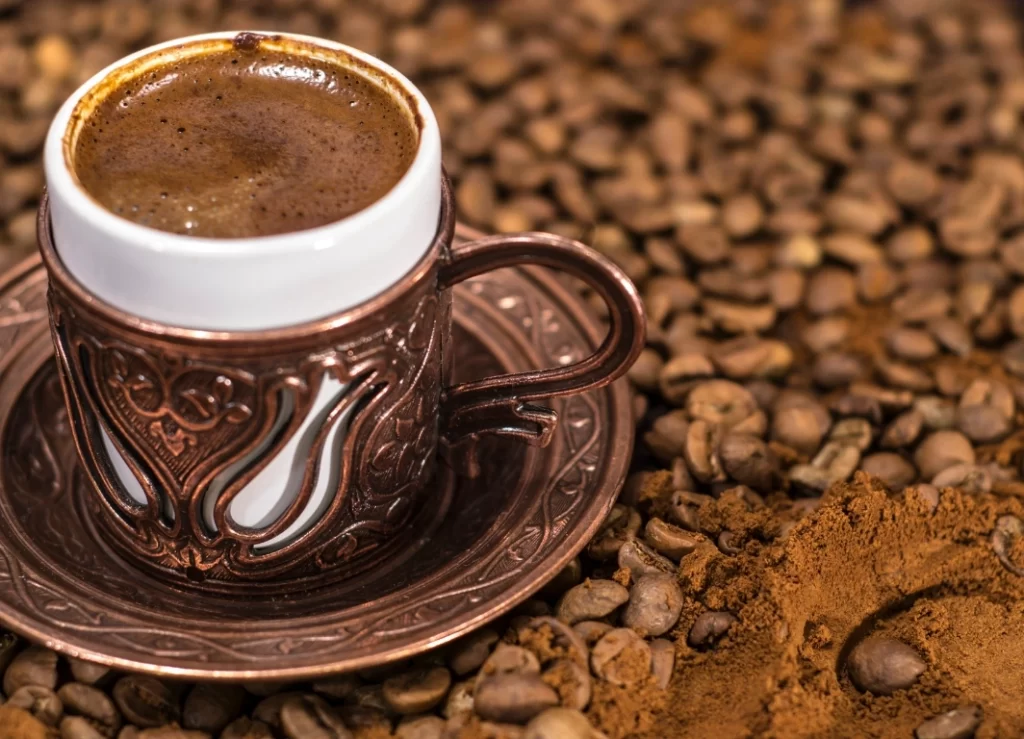
The Art and Sentiment Behind Greek Coffee
In older generations, preparing Greek coffee was considered an art, and the frothy layer on top, known as kaimaki, was a key indicator of skill and care. The bubbles (or “bumps”) that form in the kaimaki were especially significant. A well-prepared coffee with an even layer of kaimaki and plenty of bubbles was a sign of attention and affection for the person served. Serving a coffee with no kaimaki or bubbles, on the other hand, meant the coffee had been over-boiled, resulting in a poor taste.
Symbolically, a coffee without kaimaki was associated with grief and loss, as it was traditionally served at funerals. This bittersweet connection underscores how much meaning Greeks attribute to the preparation of their coffee.
For those with true talent, crafting a coffee with precisely three distinct bubbles in the kaimaki was considered the ultimate demonstration of skill and care. This delicate balance required immense focus and mastery, and serving such a coffee was a profound gesture of thoughtfulness and affection.
Greek coffee is much more than a drink—it’s a heartfelt tradition filled with history, artistry, and sentimentality. Whether you opt for a classic sketos, a sweet vari glykos, or a modern cold brew, remember that every cup is a reflection of the Greek spirit: warm, inviting, and full of care.
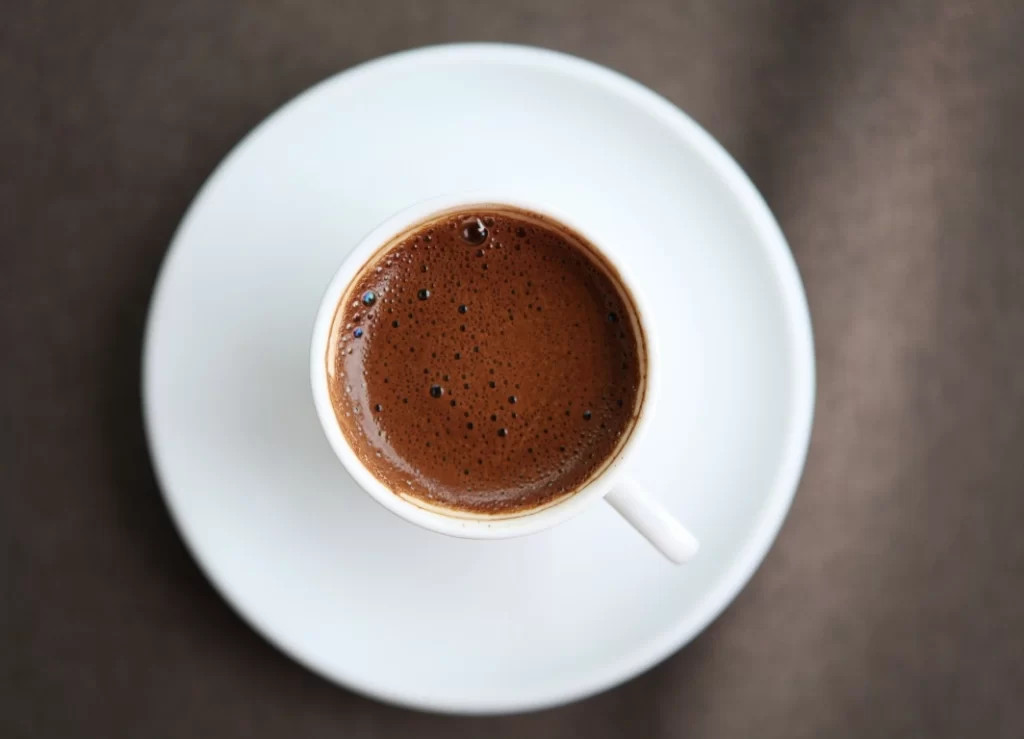
Exploring the Art of Harmani: Choosing the Perfect Greek Coffee Blend
In Greece, coffee is not just a beverage—it’s an art form, deeply connected to mood, lifestyle, and tradition. The word harmani refers to the blend of coffee beans, and selecting the right harmani is as important as the way the coffee is prepared. Greek coffee lovers know that the type of harmani you choose can transform the experience, making every sip unique. Here’s a guide to understanding the different types of harmani so you can order like a local during your visit:
- Xantho Harmani (Ξανθό χαρμάνι): This “blonde blend” is made from lightly roasted beans, resulting in a milder flavor with fruity and floral notes. It’s perfect for those who prefer a lighter, more delicate cup. (unfortunately I haven’t found a link for Greek coffee with blonde blend on amazon. But if you are visiting Athens, you can find it at the authentic coffee shop of Loumidis located at 106 Aiolou str., in homonoias square in the center of Athens)
- Skouro Harmani (Σκούρο χαρμάνι): The “dark blend” features beans that are roasted longer, offering a bolder, richer flavor with smoky and earthy undertones. It’s ideal for those who enjoy a strong, robust coffee experience.
- Monopikiliako Harmani (Μονοποικιλιακό χαρμάνι): This “single-origin blend” is crafted from coffee beans sourced from one specific region, highlighting the unique flavor profile of that origin. Whether it’s Ethiopian, Brazilian, or Colombian, monopikiliako offers a sophisticated, tailored coffee experience.
- Arabic Harmani (Αραβικό χαρμάνι): Made with a higher concentration of Arabica beans, this blend is smooth, aromatic, and slightly acidic, making it a favorite for those who love complexity and a refined taste.
- Special Origin Harmani (Ειδικής προέλευσης χαρμάνι): For the coffee connoisseurs, this blend features rare and exclusive beans from specific farms or regions, offering a unique, luxurious flavor. (unfortunately I haven’t found a link for Greek coffee with Special Origin blend on amazon. But if you are visiting Athens, you can find it at the authentic coffee shop of Loumidis located at 106 Aiolou str., in homonoias square in the center of Athens)
- Decaf (Ντεκαφεϊνέ): For those who want to enjoy the rich taste of Greek coffee without the caffeine, decaffeinated harmani ensures the same bold flavor without compromising on quality.
- Harmani with Chios Mastic, Cinnamon, or Cardamom: For a touch of creativity, some harmanis are infused with Chios mastic, cinnamon, or green cardamom, adding aromatic layers that elevate the coffee into a sensory experience. These blends are perfect for those who enjoy exotic or spicy notes in their coffee. (unfortunately I haven’t found a link for Greek coffee with Chios Mastic, cinnamon or cardamomum blend on amazon. But if you are visiting Athens, you may also find them at the authentic coffee shop of Loumidis located at 106 Aiolou str., in homonoias square in the center of Athens)

A Coffee for Every Mood and Occasion
The art of Greek coffee extends beyond the harmani to how it’s consumed. Whether you’re savoring a solitary moment of peace or sharing a long conversation with loved ones, each cup carries a Rite of Passage. Greek coffee is not meant to be rushed—it’s a deliberate act of slowing down, connecting with yourself or others, and cherishing the present moment. Choosing the right harmani is an intimate decision, influenced by your mood, lifestyle, and the occasion.
So, whether you crave the lightness of xantho harmani, the boldness of skouro harmani, or the exotic aromas of spiced blends, Greek coffee invites you to indulge in its rich tradition, one sip at a time.
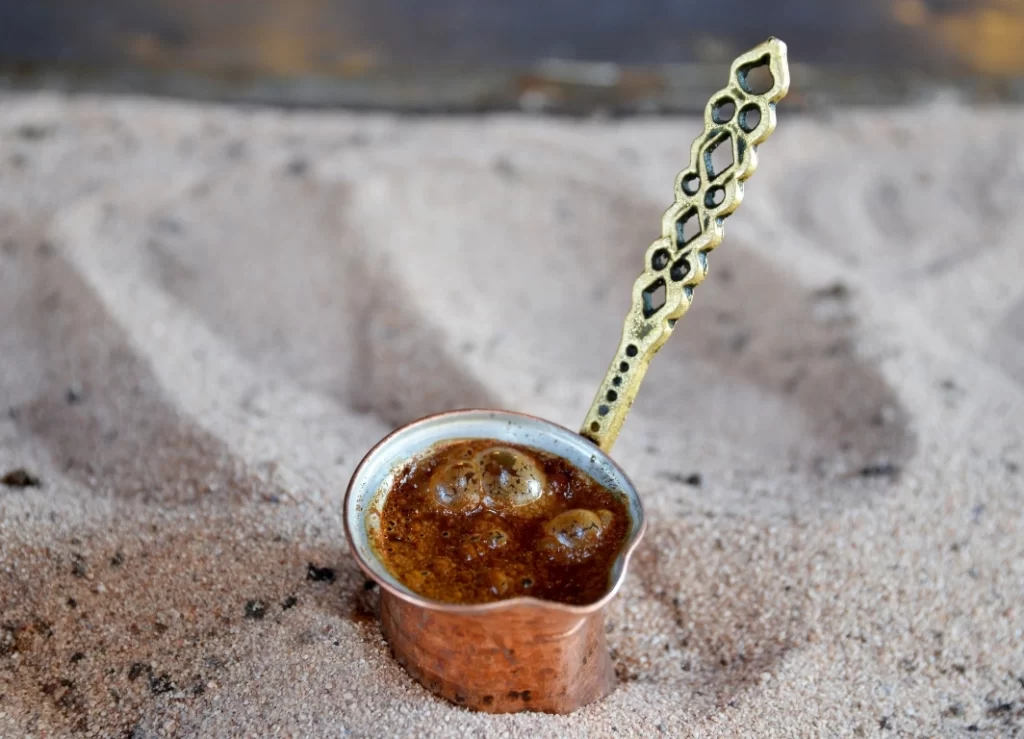
A Unique Tip: Experience Greek Coffee Made in a Hovoli
When visiting Greece, make it a priority to seek out a traditional Greek coffee shop where the coffee is prepared in a hovoli. The hovoli is a bed of hot ash traditionally used for slow roasting and simmering coffee, chestnuts, and other delicacies. This ancient method is not just about brewing—it’s a sensory experience that elevates the art of Greek coffee to new heights.
Coffee made in the hovoli is simmered gently in the hot ash, ensuring an even and slow heating process. This method allows the flavors to develop fully, creating a brew that is noticeably smoother, richer, and more aromatic. The result is a cup of coffee that’s mellow yet intensely flavorful—a true reflection of Greek culinary tradition.
Enjoying Greek coffee from the hovoli is more than just a taste—it’s a connection to the past, offering a glimpse into the way coffee was enjoyed for generations. So, whether you’re strolling through a quiet village or exploring the bustling streets of Athens, make time to savor this exceptional coffee-making technique. It’s a delicious and authentic experience you won’t want to miss!
Nutritional Analysis of Traditional Greek Coffee (Plain/ Per Serving)
| Nutrient | Amount | % Daily Value (DV) |
| Calories | 2 | 0% |
| Protein | 0 g | 0% |
| Total Fat | 0 g | 0% |
| Saturated Fat | 0 g | 0% |
| Total Carbohydrates | 0 g | 0% |
| Sugars | 0 g | 0% |
| Dietary Fiber | 0 g | 0% |
| Sodium | 5 mg | <1% |
| Potassium | 60 mg | 2% |
| Magnesium | 7 mg | 2% |
| Antioxidants | High (depends on the quality of the coffee bean and the procedure) | – |
Embrace the Tradition for Health and Longevity
Traditional Greek coffee is more than just a drink—it’s a lifestyle choice deeply embedded in the Ikarian way of life. Its heart-protective, anti-inflammatory, and cognitive-enhancing benefits, backed by scientific evidence, make it a vital component of a healthy, longevity-promoting diet.
So, why not incorporate this ancient brew into your daily routine? Not only will you experience its unique taste, but you’ll also reap the remarkable health benefits it offers. Remember, as the Ikarian elders say, “Sip it slowly and savor life.”

Discover the Iconic Papagalos Loumidis: Greece’s Most Beloved Coffee Brand
No discussion about traditional Greek coffee would be complete without mentioning Papagalos Loumidis, a household name synonymous with quality, tradition, and Greek culture. For nearly a century, Papagalos Loumidis has been the go-to coffee brand for Greeks of all ages. Founded in 1920, this iconic brand captures the heart and soul of Greece with its rich, aromatic blend that embodies the essence of Greek hospitality (philoxenia) and cherished coffee moments shared among friends and family.

The secret to Papagalos Loumidis’ enduring popularity lies in its meticulous quality standards. The coffee beans are carefully selected, expertly roasted, and finely ground to create the signature velvety texture and bold flavor that Greeks adore. The cheerful green parrot logo, or “papagalos,” is instantly recognizable, representing trust, nostalgia, and a sense of home.
Ask any Greek, and they’ll tell you: life isn’t complete without a cup of Papagalos Loumidis. Whether you’re a seasoned coffee lover or new to the world of Greek coffee, Papagalos Loumidis is your gateway to experiencing authentic Greek culture. Pair it with a plate of loukoumades (honey donuts) or enjoy it while soaking in the serene ambiance of a sunny morning—it’s more than just coffee; it’s a taste of Greece itself.
If you’re looking to brew the perfect traditional Greek coffee, choosing Papagalos Loumidis ensures you’re savoring the best. Experience the time-honored tradition that has been passed down for generations and taste why Greeks trust and love their Papagalos. Try it today and bring the essence of Greece into your cup!

Drink it as a Greek! Embrace the Greek Coffee Tradition Today!
Why wait until your next trip to Greece to experience the rich, aromatic flavors and health benefits of traditional Greek coffee? You can start savoring this timeless beverage right now from the comfort of your home! With its unique preparation, unmatched taste, and proven health benefits, Greek coffee is more than just a drink—it’s a lifestyle.
Discover premium Greek coffee brands like Papagalos Loumidis, crafted with the finest quality and cherished by Greeks for nearly a century. You don’t need a passport to enjoy this authentic experience; simply order your favorite Greek coffee blends on Amazon and bring the magic of Greece to your cup.
Start your journey to health, flavor, and tradition today—click the link below and make Greek coffee your daily ritual!
Papagalos Loumidis Classic Arabic Blend
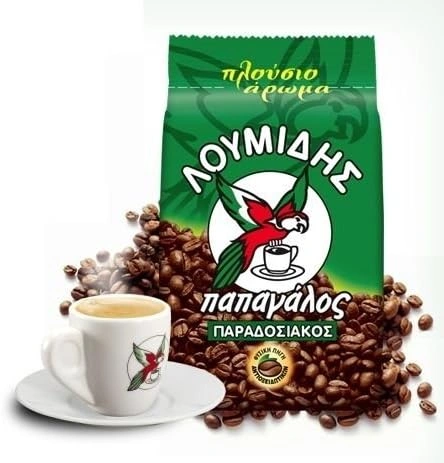
Papagalos Loumidis Dark Blend
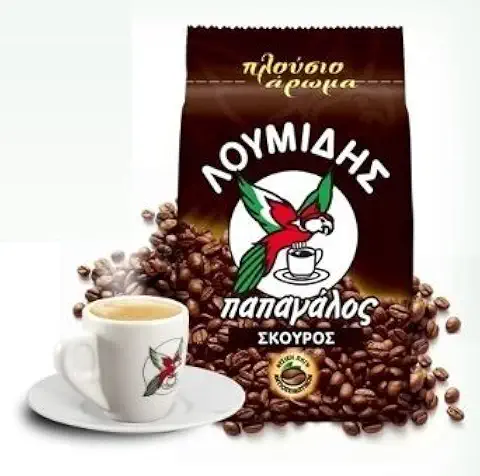
Papagalos Loumidis Monopikiliakos Blend
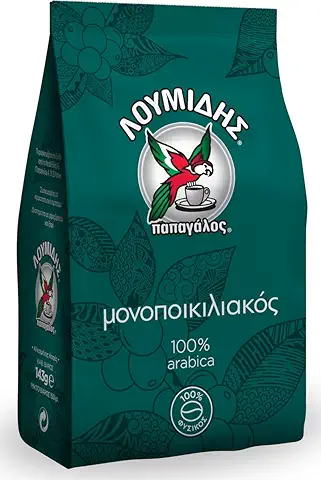
Papagalos Loumidis Decaf
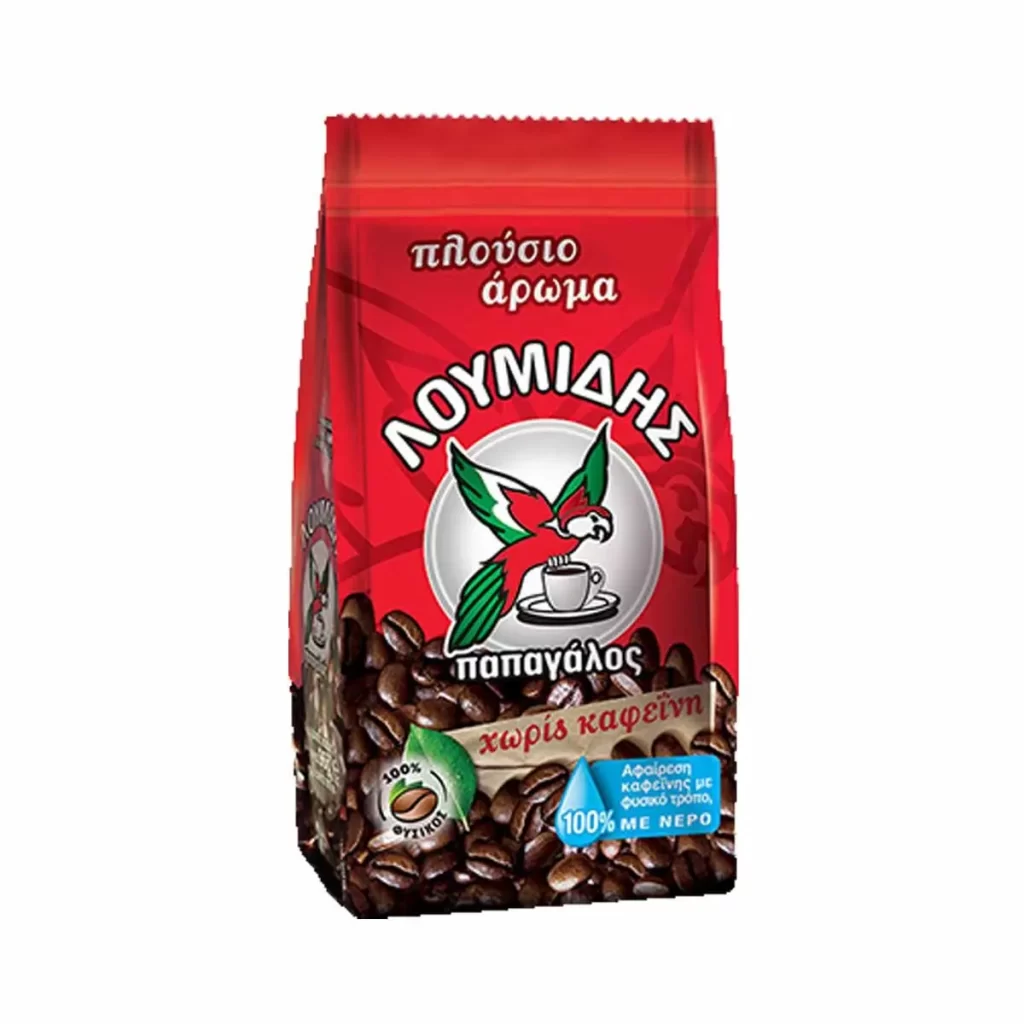
Scientific References about the health benefits of coffee in general and particularly the traditional greek
Siasos, G., Oikonomou, E., Chrysohoou, C., Tousoulis, D., Panagiotakos, D., Zaromitidou, M., Zisimos, K., Kokkou, E., Marinos, G., Papavassiliou, A. G., Pitsavos, C., & Stefanadis, C. (2013). Consumption of a boiled Greek type of coffee is associated with improved endothelial function: The Ikaria Study. Vascular Medicine, 18(2), 55–62. https://doi.org/10.1177/1358863X13480258
Van Dam, R. M., Hu, F. B., & Willett, W. C. (2020). Coffee, caffeine, and health. New England Journal of Medicine, 383(4), 369–378. https://doi.org/10.1056/NEJMra1816604
Vasilopoulou, E., Georga, K., Joergensen, M. B., Naska, A., & Trichopoulou, A. (2005). The antioxidant properties of Greek foods and the flavonoid content of the Mediterranean menu. Current Medicinal Chemistry – Immunology, Endocrine & Metabolic Agents, 5(1), 33–45. https://doi.org/10.2174/1568013053005508
Tsai, C. F., Chen, J. H., Yeh, W. L., & Wu, H. Y. (2016). Neuroprotective effects of caffeine in Parkinson’s disease. Frontiers in Neuroscience, 10, 534. https://pubmed.ncbi.nlm.nih.gov/26626997/
Willett, W., & Ludwig, D. S. (2013). The role of antioxidants in cardiovascular health. Journal of Nutrition and Health, 26(2), 123–134. https://pmc.ncbi.nlm.nih.gov/articles/PMC11357572/
National Toxicology Program (1999). Cafestol (CASRN 469-83-0) and Kahweol (CASRN 6894-43-5) — Review of Toxicological Literature. https://ntp.niehs.nih.gov/sites/default/files/ntp/htdocs/chem_background/exsumpdf/cafestol_508.pdf
Higdon, J. V., & Frei, B. (2006). Coffee and health: a review of recent human research. Critical Reviews in Food Science and Nutrition, 46(2), 101–123. https://doi.org/10.1080/10408390500400009

This page contains Amazon affiliate links. This means that if you click on an affiliate link and make a purchase, I may receive a small commission at no additional cost to you. As a pharmacist, I only recommend products that I personally trust and believe will be valuable to my audience. Thank you for supporting my website!
